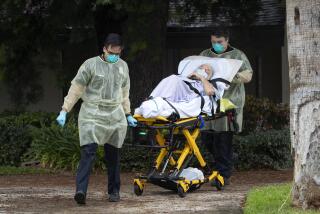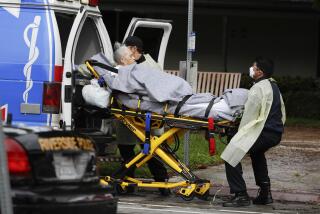For quality care, the staff is key
- Share via
The cornerstone to quality care in a nursing home is staffing. Those with larger staffs tend to have less turnover, more stability and are more likely to meet the needs of all the residents.
“There is some very persuasive data showing staff simply can’t perform all of the responsibilities they have unless there is an adequate ratio of staff to residents,” says Janet Wells, policy director for the National Citizen’s Coalition for Nursing Home Reform, a reform-activist-advocacy organization?
Homes should be staffed to provide at least 3 1/2 to four hours of care per resident in a 24-hour period, says Larry Minnix, chief executive of the American Assn. of Homes and Services for the Aging, a nonprofit organization that represents not-for-profit elder-care facilities. Some may even offer four to five hours daily.
Minnix recommends asking a facility how much care it provides to patients. This information is also reported on Nursing Home Compare (it is loosely tallied by dividing the number of hours worked daily by the number of residents at the facility).
To assess staffing levels, Pat McGinnis, executive director of California Advocates for Nursing Home Reform, recommends visiting at a time when a facility is most likely to have maximum staff on duty (like at lunch, the biggest meal of the day). Telltale signs of understaffing include diners with food trays who are not eating because they are not receiving necessary assistance, residents sitting idly in common areas or their rooms with nothing to hold their attention, and call buttons going unanswered.
“If they don’t have enough staff then, they won’t late at night,” she says.
Visiting during mealtime is also a good way to gauge food quality. Weight loss can be dangerous to the elderly, so food should look and smell appetizing.
Some of the more progressive homes have buffet lines rather than the “school lunchroom program,” in which residents shuffle through with trays, Minnix says.
“Food is the most looked-forward-to institution for many people, especially those confined to a home,” he says. “You should ask about snacks and what kind of weight loss-weight gain program they have.”
Sometimes, outside resources can help in assessing a home. Minnix recommends talking with a hospital discharge planner, people in the nursing home’s neighborhood and family members of other nursing home residents (catch them when they’re leaving the facility, he suggests).
--
More to Read
Sign up for Essential California
The most important California stories and recommendations in your inbox every morning.
You may occasionally receive promotional content from the Los Angeles Times.













